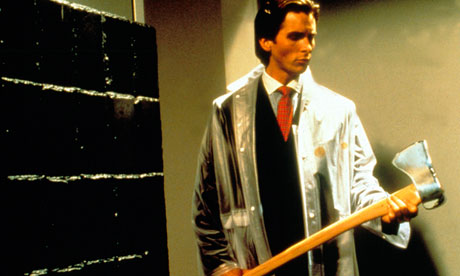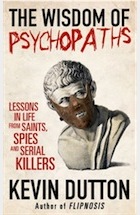The Wisdom of Psychopaths by Kevin Dutton – review

Christian Bale as Patrick Bateman in the 2000 film adaptation of Bret Easton Ellis’s novel American Psycho. Photograph: Moviestore Collection/Rex
Do you think like a psychopath? It has been claimed that one quick way of telling is to read the following story and see what answer to its final question first pops into your head:
While attending her mother's funeral, a woman meets a man she's never seen before. She quickly believes him to be her soulmate and falls head over heels. But she forgets to ask for his number, and when the wake is over, try as she might, she can't track him down. A few days later she murders her sister. Why?
If the first answer that springs to your mind is some variation of jealousy and revenge – she discovers her sister has been seeing the man behind her back – then you are in the clear. But if your first response to this puzzle is "because she was hoping the man would turn up to her sister's funeral as well", then by some accounts you have the qualities that might qualify you to be a cold-blooded killer – or a captain of industry, a nerveless surgeon, a recruit for the SAS – or which may well make you a commission-rich salesman, a winning barrister, a charismatic clergyman or a red-top journalist. The little parable purports to reveal those qualities – an absence of emotion in decision making, a cold focus on outcomes, an extremely ruthless and egocentric logic – which tend to show up in disproportionate degrees in all those individuals.
There is a problem though. When Kevin Dutton, the author of this compulsive quest into the psychopathic mind, tried the question on some real psychopaths, not one of them came up with the "second funeral" motive. As one commented: "I might be nuts but I'm not stupid."
The admirable quality of this book is Dutton's refusal to accept easy answers in one of the more sensational fields of popular psychology. He comes at the challenge of deconstructing the advantages and dangers of psychopathic behaviour with two distinct motivations. First, the academic rigour of a research fellow at Magdalen College, Oxford. Second, with the more human need to understand the character of his late father, a market trader in the East End, a man with an "uncanny knack of getting exactly what he wanted", who could sell anything to anybody, because to him "there were no such things as clouds, only silver linings". Psychopaths, we learn, are the ultimate optimists; they always think things will work in their favour.
Dutton's curiosity takes him from boardrooms and law courts to neurological labs. He tries in different ways to get inside the heads of those individuals for whom killing has been a way of life – from Bravo Two Zero's Andy McNab to the video game-obsessed inmates of Broadmoor's secure wards. In his effort to get to their truths he has a tendency to write with the one-tone-fits-all breeziness of the excited enthusiast; at certain points his insistent chattiness jars. Though he demonstrates few of the characteristics of psychopaths himself, none of the limited range of cold fury of Viking "berserkers" or the wilful icy detachment of brain surgeons, he is in thrall to their possibilities. Perhaps, he argues, we all are.
Dutton's book at any rate supports the idea that to thrive a society needs its share of psychopaths – about 10%. It not only shows the value of the emotionally detached mind in bomb disposal but also the uses of the psychopath's ability to intuit anxiety as demonstrated by, for example, customs officials. Along the way his analysis tends to reinforce the idea that the chemistry of megalomania which characterises the psychopathic criminal mind is a close cousin to the set of traits often best rewarded by capitalism. Dutton draws on a 2005 study that compared the profiles of business leaders with those of hospitalised criminals to reveal that a number of psychopathic attributes were arguably more common in the boardroom than the padded cell: notably superficial charm, egocentricity, independence and restricted focus. The key difference was that the MBAs and CEOs were encouraged to exhibit these qualities in social rather than antisocial contexts.
As Dutton details this relationship, part of you is left wondering if the judge who recently praised a housebreaker for his courage and resourcefulness, and expressed the hope that in the future he might use his energies in more constructive directions, might have had Dutton's book by his bedside. Certainly you are left wondering if corporations that really want to find driven leaders might be as well to conduct their recruitment round in the juvenile courts as the universities. In this sense it is hard to know which is more chilling: the scene in which Dutton weighs a serial killer's brain in his hands and reveals it to be in no way tangibly different from yours or mine, or the research that shows the ability of American college students to empathise with others has, in the past 30 years, reduced by 40%…


No comments:
Post a Comment